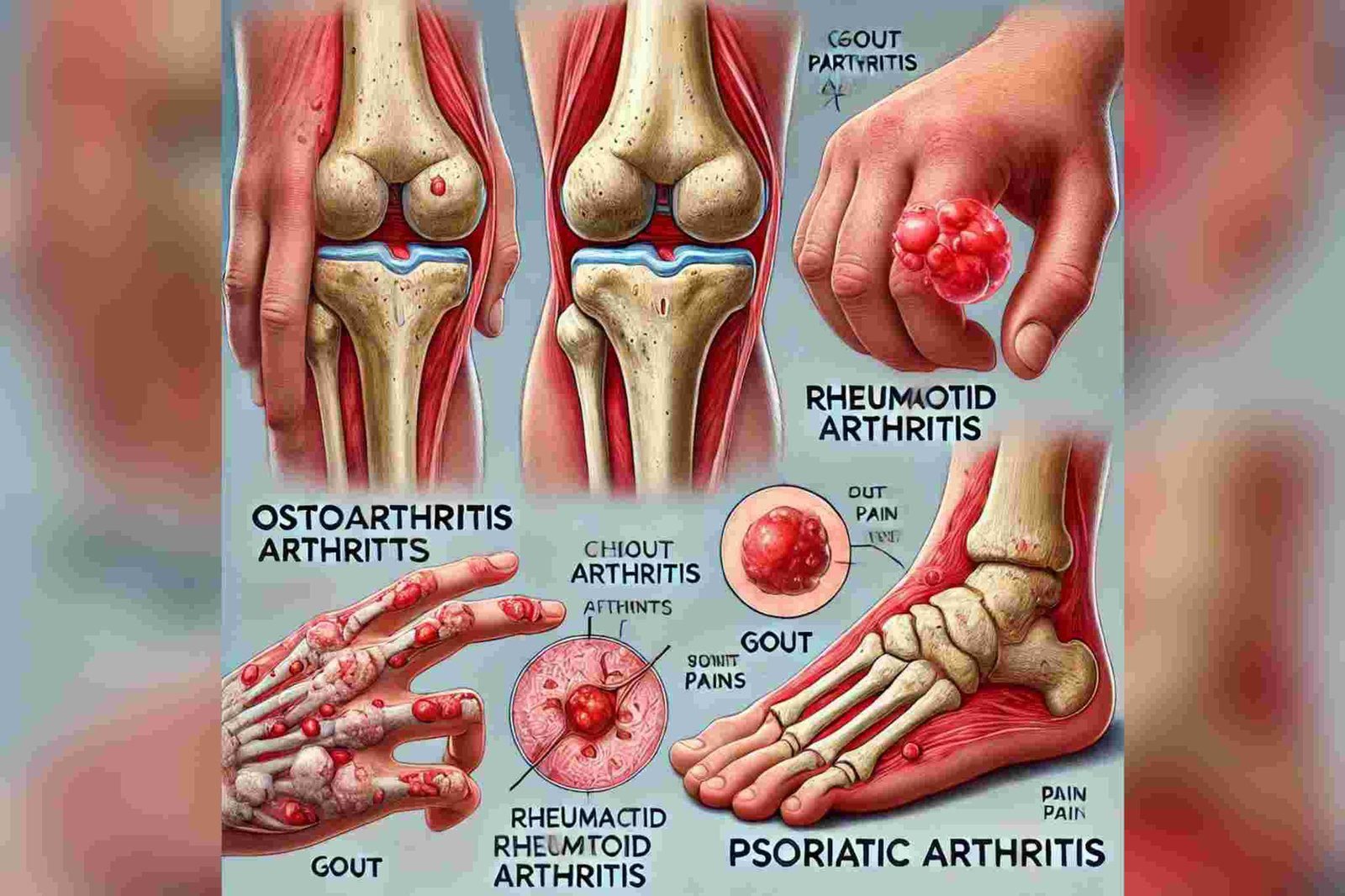Arthritis is a common medical condition that affects millions of people worldwide. It refers to the inflammation of one or more joints, leading to pain, stiffness, and swelling. While there are over 100 types of arthritis, the most prevalent forms are osteoarthritis (OA) and rheumatoid arthritis (RA). Recognizing the symptoms early is key to effective management and improving quality of life.
Table of Contents
Arthritis and Its Types
Arthritis can manifest in different ways depending on its type. Below are the two most common types of arthritis:
- Osteoarthritis (OA)
This is the most common form of arthritis, often referred to as “wear-and-tear” arthritis. It occurs when the protective cartilage cushioning the ends of bones wears down over time. - Rheumatoid Arthritis (RA)
RA is an autoimmune disorder where the immune system mistakenly attacks the joints, causing inflammation and damage to the joint lining.
Other types include psoriatic arthritis, gout, and ankylosing spondylitis.
Common Symptoms of Arthritis
Arthritis symptoms can vary significantly depending on the type, severity, and progression of the condition. Below are the primary symptoms:
- Joint Pain
Description: Pain is the hallmark symptom of arthritis, ranging from mild discomfort to severe, debilitating pain. It may be constant or come and go.
Location: Commonly affects the knees, hips, hands, and spine in OA, while RA often impacts smaller joints like fingers and toes.
- Stiffness
Morning Stiffness: A classic symptom, especially in RA. Stiffness lasting more than 30 minutes may indicate inflammatory arthritis.
After Inactivity: Prolonged sitting or inactivity can worsen joint stiffness.
- Swelling
Inflammation: Swollen joints, often warm to the touch, are common in both OA and RA. RA-induced swelling may also cause noticeable redness.
- Reduced Range of Motion
Impact: Arthritis can limit joint flexibility, making everyday activities challenging. For example, bending the knees or gripping objects may become difficult.
- Joint Deformity
Chronic Cases: In advanced arthritis, particularly RA, joints may become deformed due to prolonged inflammation and damage.
- Cracking or Grinding Sensations
Crepitus: In OA, you might feel or hear a cracking or grinding sensation when moving the affected joint due to cartilage wear.
- Fatigue
RA-Related: Chronic fatigue is a common systemic symptom of RA, often accompanied by low-grade fever and general malaise.
- Bone Spurs
OA Indicator: Bony growths or spurs may develop around the joint, particularly in the fingers or spine.
- Warmth and Redness
Inflammation Signs: Joints affected by inflammatory arthritis may appear warm and red.
- Systemic Symptoms
RA and Other Inflammatory Types: Symptoms like weight loss, fever, and anemia may occur in RA or lupus-related arthritis.

How Symptoms Differ by Arthritis Type
- Osteoarthritis Symptoms
- Pain worsens with activity and improves with rest.
- Affects weight-bearing joints like the knees and hips.
- Localized swelling and bone spurs.
- Rheumatoid Arthritis Symptoms
- Symmetrical joint involvement (both sides of the body).
- Systemic symptoms such as fatigue and fever.
- Progressive joint deformities if untreated.
- Psoriatic Arthritis Symptoms
- Joint pain accompanied by patches of red, scaly skin (psoriasis).
- Inflammation in tendons, causing pain in heels or soles.
- Gout Symptoms
- Sudden, severe pain in a single joint, often the big toe.
- Redness, swelling, and heat in the affected area.
Risk Factors for Arthritis Symptoms
the risk factors can help identify potential causes and manage the symptoms effectively.
Age: Risk increases with age, especially for OA.
Gender: Women are more likely to develop RA, while men are prone to gout.
Obesity: Extra body weight adds stress to weight-bearing joints.
Genetics: A family history of arthritis increases susceptibility.
Injuries: Joint injuries can trigger or worsen arthritis symptoms.
When to See a Doctor
If you experience any of the following symptoms, consult a healthcare provider promptly:
Persistent joint pain lasting several weeks.
Swelling, redness, or warmth in joints.
Difficulty performing daily tasks due to joint stiffness or pain.
Fatigue, fever, or unexplained weight loss.
Tips to Manage Arthritis Symptoms
While arthritis cannot be cured, several strategies can help manage symptoms and improve quality of life:
- Lifestyle Changes
Regular Exercise: Low-impact exercises like walking, swimming, and yoga improve joint mobility.
Healthy Diet: Anti-inflammatory foods like fatty fish, nuts, and leafy greens can reduce symptoms.
Weight Management: Maintaining a healthy weight reduces stress on joints.
- Medication
Over-the-counter pain relievers like acetaminophen or NSAIDs.
Prescription medications, including disease-modifying antirheumatic drugs (DMARDs) for RA.
- Physical Therapy
A therapist can design a program to strengthen muscles around joints and improve flexibility.
- Assistive Devices
Braces, canes, or shoe inserts can provide additional support and reduce strain.
- Heat and Cold Therapy
Heat: Relieves stiffness and improves blood flow.
Cold: Reduces inflammation and numbs pain.
- Alternative Therapies
Acupuncture, massage, and herbal supplements like turmeric may offer relief for some individuals.
- Surgical Intervention
In severe cases, joint replacement surgery may be necessary.
Final Thoughts
Arthritis symptoms can significantly impact daily life, but with early diagnosis and proactive management, it is possible to maintain a good quality of life. Pay attention to your body and consult a doctor if symptoms persist or worsen. Incorporating a healthy lifestyle and staying informed can make a world of difference in managing arthritis.
By understanding your symptoms and taking appropriate steps, you can regain control and lead an active, fulfilling life despite arthritis.






